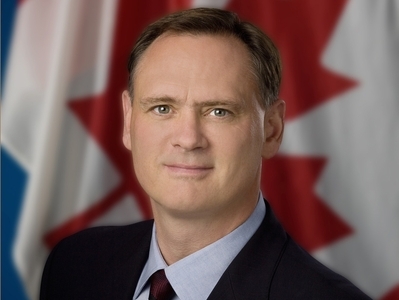
Governments have a responsibility to get the big things right
By David McGuinty.
Governments have a responsibility to get the big things right. Transportation safety is certainly one of them. Commercial vehicle driver fatigue is a serious issue that deserves our attention. However, there is often confusion about jurisdictional responsibilities for transportation regulations.
According to Transport Canada, “Provincial and territorial regulations govern the operation of the commercial bus and truck industry except for the rules and regulations Transport Canada’s Motor Carrier Division sets in support of the safe operation of federally-regulated (extra-provincial) motor carriers and commercial vehicle drivers.
The federal government only has authority over extra-provincial truck and bus carriers that carry goods or passengers across a provincial or international boundary.” The federal government administers the Motor Vehicle Transport Act. The relevant regulations under this act are the Commercial Vehicle Drivers Hours of Service Regulations (SOR/2005-313), which set the hours of work and rest rules for federal motor carriers and their drivers.
The seriousness of this issue was highlighted by the Commercial Motor Vehicle Driver Fatigue and Alertness Study (1997) conducted by the US Federal Motor Carrier Safety Administration (FMCSA) and Transport Canada. The study observed 80 commercial vehicle operators, aged 25 to 65, on 360 trips that covered a total of 200,000 miles and produced the following findings:
• Time of day was the single best predictor of decreased driving performance.
• 19 minutes out of the 244,667 minutes of video showed drivers falling asleep.
• A 13-hour drive with a night-time start was associated with the most sleep deprivation.
You might ask, what is the government doing to address this problem, and is it enough? This summer, the Minister of Transport and the Administrator of the U.S. Department of Transportation’s FMCSA, announced the launch of the North American Fatigue Management Program (NAFMP), a web site that provides training and education on commercial bus and truck driver fatigue management. This is a good start but much more needs to be done.
The Canadian Council of Motor Transport Administrators (CCMTA) is a non-profit organization comprising representatives of the provincial, territorial and federal governments of Canada which, through the collective consultative process, makes decisions on administration and operational matters dealing with licensing, registration and control of motor vehicle transportation and highway safety. It also includes associates whose expertise and opinions are sought in the development of strategies and programs.
The Amalgamated Transit Union is calling on the government to make changes to the legislation surrounding the hours of service for motor coach drivers. They state that “Motor coach drivers are forced to work long hours with minimal compensation and very little time between shifts. As a result, a driver’s reaction time decreases and the opportunity for a fatal collision increases.” In an attempt to reduce driver fatigue they are calling on the government to implement:
• 10-hour maximum drive time per day
• 14-hour maximum on duty per day
• 10-hour minimum guarantee for rest between shifts
• All motor coach vehicles equipped with electronic logging technology
• A distinction between motor coach vehicles and trucks
This issue of driver fatigue is certainly not a new concern, but is being brought to the forefront by other recent devastating transportation accidents. The issue of hours of service was studied by the Standing Committee on Transport and Government Operations in the 37th Parliament. Their report of June 2002 contained the following three recommendations: • After consultations with the Provinces, the CCMTA, stakeholders and organized labour, Transport Canada consider adopting the combined CTA/ Teamsters – CCMTA proposal for hours of service.
• Transport Canada, the CCMTA and stakeholders give careful consideration to the issues surrounding the hours of service debate in implementing a new regime;
• Any new hours of service regime be subject to a trial period after which Transport Canada report to Parliament on the operation of the new hours of service rules.
A government has no greater responsibility than the safety of its citizens. However, Public Accounts recently tabled by the government show shocking cuts to road safety programs. Precisely when the government should be investing in road safety, it is cutting road safety initiatives 5.5 per cent from $23.8 million (2011-12) to $22.5 million (2012-13). At the same time, the Conservative Government is spending twice that amount, about $40 million annually, on Economic Action Plan ads. The government should be ashamed of wasting millions of dollars on partisan propaganda when it could be making investments in transportation safety for Canadians. I have repeatedly asked the Minister, Transport Canada Officials, and even the Auditor General to explain these outrageous figures. I have yet to receive a credible response but I will keep asking as it’s well past the time for the Conservatives to make transportation safety a top priority.
David McGuinty is the Liberal Member of Parliament for Ottawa South.








